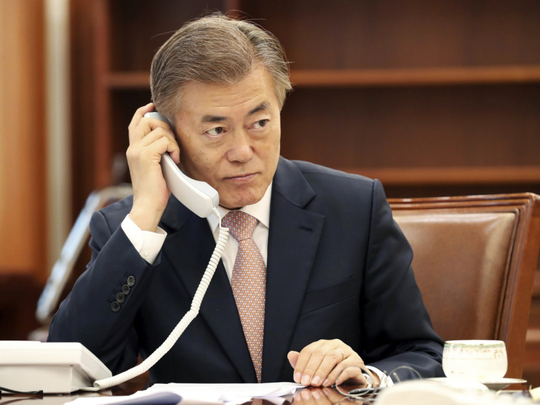
Having lost to Park Geun-hye in the 2012 presidential election, Moon Jae-in became the chief beneficiary of the abuse-of-power scandal that has engulfed his erstwhile opponent in South Korea. Moon’s victory in the race to the presidential Blue House in Seoul could herald an era of rapprochement with North Korea, and an unlikely meeting of minds with United States President Donald Trump over Pyongyang’s nuclear and ballistic missile programmes. The 64-year-old liberal positioned himself as the only candidate qualified to reunite the country after the bitter divisions that opened up over Park’s allegedly corrupt relationship with her longtime friend and confidante Choi Soon-sil.
While Park sits in detention awaiting trial on charges that could see her sentenced to life in prison, Moon tapped into the country’s appetite for change to open up a double-digit lead over his closest rival, the centrist software entrepreneur Ahn Cheol-soo. In a month that has seen rising tensions on the Korean peninsula over Pyongyang’s nuclear and ballistic missile programmes, Moon criticised the hard line pursued by Park and her predecessor, Lee Myung-bak, pointing out that a decade of conservative rule had done nothing to arrest the regime’s nuclear programme.
Significantly, North Korea has indicated that it favoured Moon, with state media calling on South Korean voters to “punish the puppet group of conservatives” associated with Park. Eager to court the older conservative voters who consigned him to a narrow defeat five years ago, Moon has shown himself to be a pragmatist. He has stopped short of overtly criticising Trump’s aggressive tone during the most recent crisis on the Korean peninsula, and has declared that he and the US president are “on the same page” in regarding the policy of “strategic patience” followed by the administration of former US president Barack Obama as a failure.
Working-level “talks about talks” with North Korea are a possibility, according to Moon’s foreign policy adviser, but, like Trump, Moon has so far ruled out a summit with Kim Jong-un unless the regime commits to abandoning its nuclear ambitions. Although Moon was critical of Washington’s rush to deploy its missile defence system in a South Korean village late last month, he has said only that he would “review” its future. He also supports the reopening of the Kaesong industrial complex, a joint North-South project that was regarded as a symbol of cross-border cooperation until it was “temporarily” closed in early 2016.
Given the speculation that North Korea could be preparing to conduct its sixth nuclear test in just over a decade — a move that the White House has hinted could invite military retaliation — it is easy to forget that South Korea’s vote, called seven months early, was initially prompted by issues closer to home. Moon has promised to reform South Korea’s family-run conglomerates — or chaebol — whose shady ties to senior politicians were exposed by the Park scandal, and to address pressing domestic problems, such as rising inequality and youth unemployment.
The eldest son of a refugee from North Korea, Moon can claim to have played a role in significant moments in South Korea’s modern history. As a young conscript in South Korea’s special forces, he took part in a mission following the infamous axe murder incident inside the demilitarised zone in 1976. After a career as a human rights lawyer, he served as chief-of-staff to the then president, Roh Moo-hyun, whose pursuit of his predecessor Kim Dae-Jung’s “sunshine policy” of engagement with Pyongyang Moon hopes to emulate — this time as South Korea’s leader.
— Guardian News & Media Ltd
Justin McCurry is the Guardian’s Tokyo correspondent.









